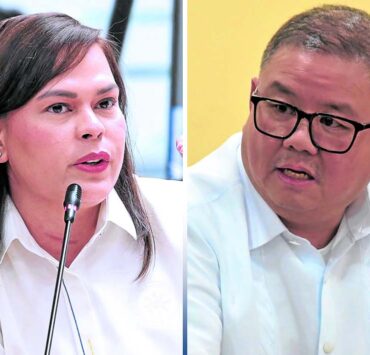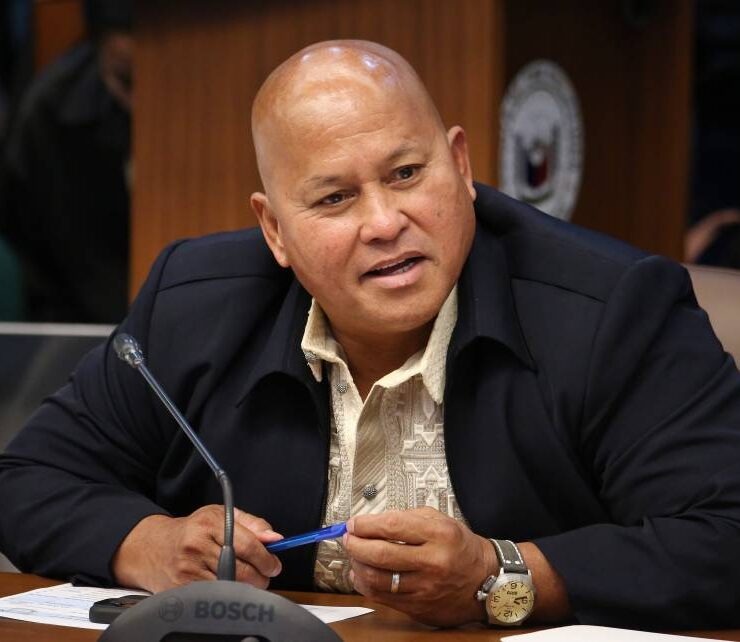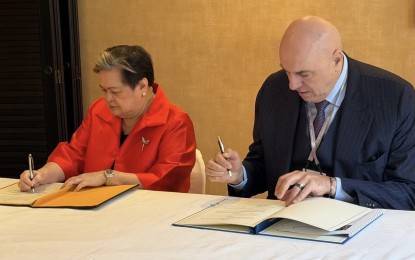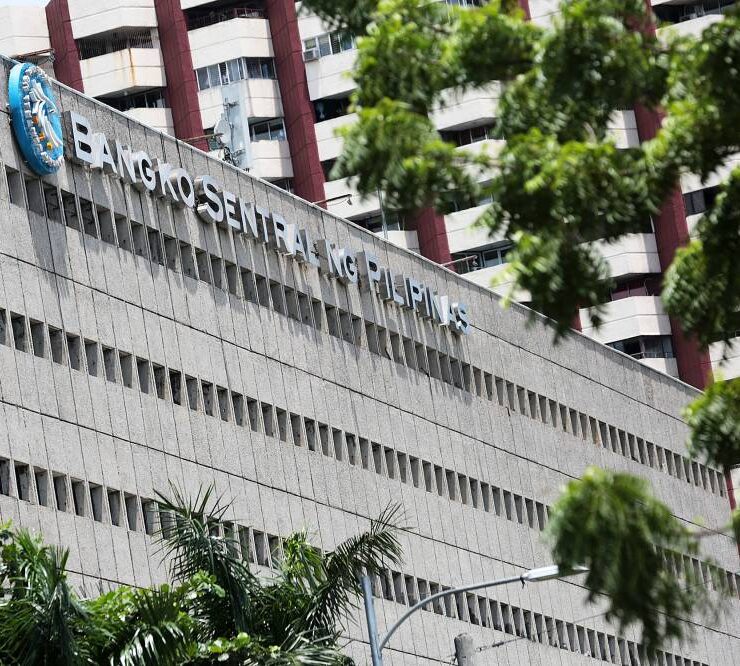Senate inquiry brings up China-funded ‘troll farm’
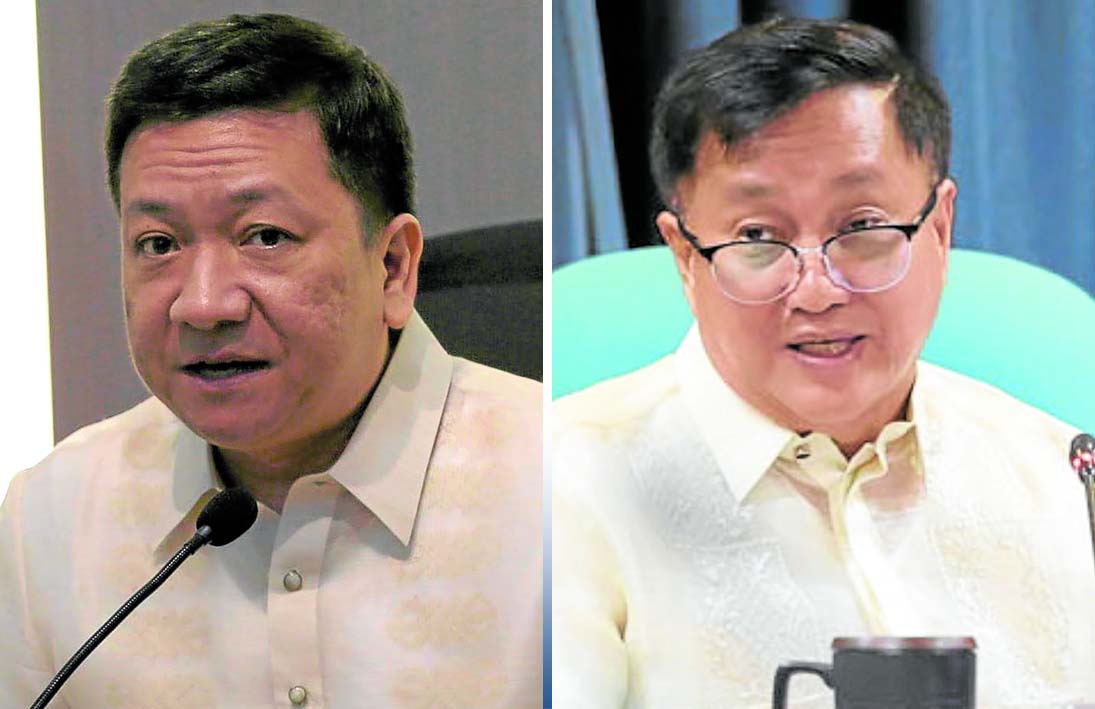
Senate Majority Leader Francis Tolentino said on Thursday that China, through its embassy in Manila, allegedly paid for a “troll farm” under a contract with a private company to discredit the Philippine government and anti-China Filipino personalities.
During the third hearing called by the Senate committee on Philippine maritime and admiralty zones, which he heads, Tolentino said a “service agreement” between the Chinese Embassy and InfinitUs Marketing Solutions Inc. in August 2023 included the provision of “keyboard warriors that will play a vital role in the overall effectiveness of the issue management project.”
He said InfinitUs was allegedly contracted to spread pro-Beijing narratives and fake news campaigns targeting lawmakers who support the Philippines’ claims over the West Philippine Sea.
‘Not a simple contract’
“This is not a simple contract,” he said. “This contract and payment mean the destruction of the dignity of the Filipino, the stomping on the dignity of the Philippines.”
The Securities and Exchange Commission should investigate the company, he said.
Tolentino, however, did not give details of the contract. He declined to provide a copy of the agreement that includes how it was supposed to be implemented.
Tolentino said the “social media army” accounts allegedly created by InfinitUs for the Chinese Embassy included 330 Facebook and 30 X (formerly Twitter) accounts. One operation is run by 11 people, including a team leader, he added.
He said that “probably these keyboard warriors are our fellow Filipinos.”
These fake accounts have garnered up to 53,322 “friends” who are real people, Tolentino said.
“So, this means that the accounts appearing on Facebook are not real people. These are trolls. Unfortunately, our fellow Filipinos are being misled,” he said.
Ordinary Filipinos are drawn to react to posts by the fake accounts.
One subject that became a topic of discussion between the fake accounts and Filipinos was the enactment of the Maritime Zones Law on Nov. 8. 2024, which resulted in attacks on both President Marcos and the country itself.
‘Like father like son’
One troll comment cited by Tolentino recalled that Mr. Marcos’ father was a dictator, insinuating that the President himself could someday become one because “as the saying goes, the fruit does not fall far from the tree, like father like son.”
According to the senator, another troll posted that China had a right to oppose the new law “because it runs counter to its territorial stand” and that the law “will just worsen our conflict with China.”
One of the personalities who were attacked was Rep. Ace Barbers, who is an outspoken opponent of Chinese incursions in the West Philippine Sea, Tolentino said.
“These troll farms were engaged not only to openly provide information and convey the policies of the Chinese government but also to act as a covert disinformation and influence operation against the Philippine government and the Filipino people,” he added.
The senator showed a mock-up copy of a check for P930,000 purportedly paid by the Chinese Embassy to InfinitUs for its services.
“This is not normal public relations, it’s not a normal PR campaign,” he said. “The money that the Chinese Embassy paid was for something hidden and sinister. It was to finance a troll farm.”
InfinitUs defers comment
The Chinese Embassy has not responded to Tolentino’s statements while the company refused to immediately comment.
“We will not be releasing any statement at the moment as we are currently looking into the matter,” InfinitUs said in a statement sent to the Inquirer on Thursday.
According to the senator, the contract and the check would reinforce reports from the country’s security sector regarding the various alleged hacking and spying activities conducted by Chinese nationals.
National Security Council (NSC) Assistant Director General Jonathan Malaya said during the hearing that, “There are indications that information operations are being conducted that are Chinese state-sponsored in the Philippines and are actually interfering in the forthcoming elections.”
‘Local proxies’
Malaya was responding to a question from Tolentino on whether the NSC had observed any indicators that suggested foreign interference in the May polls.
Tolentino was referring to interference to target anti-China candidates, like himself.
When asked to identify these indicators, Malaya cited the social media narratives from Beijing that were being “amplified” by individuals or China’s “local proxies” in the Philippines.
“Whatever script comes from Beijing, that’s also what they’re saying here in the Philippines,” he said.
The ongoing “Balikatan” exercises are being portrayed as a threat to regional peace and stability. Malaya said “you’ll also hear that kind of statement coming from local proxies who follow this script coming from Beijing.”
Malaya said that there are also indicators of ongoing operations of China to support candidates they want to win.
A Social Weather Stations survey in February showed that 78 percent of Filipinos support candidates who assert Philippine sovereignty against Chinese aggressive actions in the West Philippine Sea.
In October 2024, a poll by Pulse Asia showed that seven out of 10 Filipinos “will not support” candidates in the 2025 midterm elections who take positions favorable to China despite its maritime disputes with the Philippines.
China-backed candidates
After the hearing, Malaya told reporters that the NSC had identified the candidates allegedly backed by China, but refused to name them.
He said that it was possible that these candidates were being supported by China financially.
“We have seen that, that’s one of the tricks of the trade, so it’s perfectly possible that there is money involved here,” said Malaya.
He said there were more than 10 pro-China Filipino influencers, some of them based in the Philippines and others in China as students.
“You don’t need a large number with a troll farm using AI, a few people can multiply their presence and influence public discourse,” he said.
Commission on Elections (Comelec) Chair George Garcia on Thursday said the poll body had also come under cyberattack, specifically targeting its credibility in holding the midterm polls.
He said that intelligence and security officials informed Comelec two weeks earlier that “auto bots” and troll farms were being used in attacks “to control the narratives by conditioning the minds of the people that they cannot trust the Comelec and the results of the elections.”
“This is so dangerous and worrisome especially if indeed the perpetrator is a foreign entity,” he told reporters, declining to specify the suspected culprit.
Magnified or blown up
He said that criticisms of the Comelec, the election process and the vote counting machines immediately drew 700,000 views and 32,000 comments.
“It seems in their (intelligence agencies) view and also mine that this is coming from another country, not here,” he said.
He said that to ensure that Filipinos see these issues, they were being magnified or blown up.
They observed that there would be a sudden surge of views and comments. “And when you look at them, if you read the comments, they use the same wordings. So, this means that these come from a single source. So, the comments themselves have been trolled,” he said.
So far, the Comelec has not yet monitored any “manipulation” of its election systems. However, “thousands” of hacking attempts have been made to its online precinct finder only a day after its rollout on Wednesday.
The online precinct finder contains information about the more than 68.6 million registered voters in the country. This includes their names and dates of birth, their voting precincts and the status of their voter registration. —WITH REPORTS FROM DEXTER CABALZA, KATHLEEN DE VILLA AND INQUIRER RESEARCH














